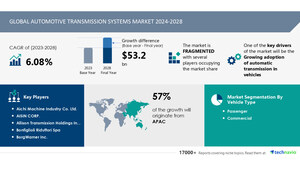NEW YORK, Dec. 4, 2024 /PRNewswire/ -- Report with market evolution powered by AI - The global ride sharing market size is estimated to grow by USD 180.02 billion from 2024-2028, according to Technavio. The market is estimated to grow at a CAGR of 26.35% during the forecast period. Increase in vehicle ownership cost is driving market growth, with a trend towards emergence of autonomous ride sharing. However, risks of theft and need for frequent maintenance poses a challenge. Key market players include ANI Technologies Pvt. Ltd., Avis Budget Group Inc., Bolt Technology OU, Cabify Espana SL, Comuto SA, Curb Mobility LLC, DENSO Corp., Enterprise Holdings Inc., Grab Holdings Ltd., GT Gettaxi UK Ltd., Hertz Holdings Inc., Ibibo Group Pvt. Ltd., iDisha Info Labs Pvt. Ltd., Lyft Inc., My Taxi Indi, PT GoTo Gojek Tokopedia Tbk, Share Now GmbH, TomTom NV, Uber Technologies Inc., and Via Transportation Inc..
Key insights into market evolution with AI-powered analysis. Explore trends, segmentation, and growth drivers- View Free Sample PDF
Ride Sharing Market Scope |
|
Report Coverage |
Details |
Base year |
2023 |
Historic period |
2017 - 2021 |
Forecast period |
2024-2028 |
Growth momentum & CAGR |
Accelerate at a CAGR of 26.35% |
Market growth 2024-2028 |
USD 180.02 billion |
Market structure |
Fragmented |
YoY growth 2022-2023 (%) |
23.41 |
Regional analysis |
APAC, Europe, North America, South America, and Middle East and Africa |
Performing market contribution |
APAC at 45% |
Key countries |
China, US, Germany, UK, and Japan |
Key companies profiled |
ANI Technologies Pvt. Ltd., Avis Budget Group Inc., Bolt Technology OU, Cabify Espana SL, Comuto SA, Curb Mobility LLC, DENSO Corp., Enterprise Holdings Inc., Grab Holdings Ltd., GT Gettaxi UK Ltd., Hertz Global Holdings Inc., Ibibo Group Pvt. Ltd., iDisha Info Labs Pvt. Ltd., Lyft Inc., My Taxi Indi, PT GoTo Gojek Tokopedia Tbk, Share Now GmbH, TomTom NV, Uber Technologies Inc., and Via Transportation Inc. |
Market Driver
The ride-sharing market is experiencing significant trends with the emergence of apps like Waze, Carma, eRideShare, CarpoolWorld, BlaBlaCar, Liftshare, and Commute with Enterprise. These platforms leverage GPS navigation and smartphone technology to help reduce greenhouse gas emissions by optimizing vehicle trips and minimizing traffic congestion. Millennials prefer ride-sharing over public transport for convenience and affordability, leading to increased demand. Mobility Service Providers (MSPs) like Gett, Didi, Go-Jek, Grab, and Ola are expanding their offerings beyond e-hailing to include food delivery, last-mile delivery, and even bikes and scooters. The car sharing market is evolving with various vehicle types, while the micromobility market focuses on the short distance segment. Business models are shifting towards profitability and sustainability, with data services, Intelligent Transportation Systems, and Automotive Vehicle-to-Everything becoming essential components. Vehicle ownership, maintenance, and component replacement costs are becoming less attractive, driving the trend towards shared mobility. Autonomous ridesharing is a growing trend, with OEMs investing heavily. However, trust and revenues remain key challenges. Passenger comfort and safety are paramount, and losses from vehicle trips can be substantial. The transportation sector is undergoing a digital transformation, with e-commerce and the sharing economy leading the way.
Cab service providers utilize vehicles as their primary mode of transportation, generating substantial data for automakers on driving patterns, traffic conditions, and road situations. Autonomous vehicles, used as taxis and parcel delivery services, offer valuable insights through real-world testing. Major autonomous vehicle manufacturers have been focusing on developing self-driving cars for taxi and delivery services since 2017. For instance, Mercedes-Benz AG partnered with Uber Technologies to launch autonomous taxis by the end of 2021. These collaborations provide a foundation for autonomous vehicles to learn and adapt to diverse driving conditions.
Request Sample of our comprehensive report now to stay ahead in the AI-driven market evolution!
Market Challenges
- Ride-sharing market is witnessing significant growth with the emergence of players like Waze, Carma, eRideShare, CarpoolWorld, BlaBlaCar, Liftshare, Commute with Enterprise, Avolon-e, and more. These Mobility Service Providers (MSPs) leverage GPS navigation and smartphone technology to offer e-hailing services, reducing reliance on public transport and personal vehicle ownership. However, challenges such as traffic congestion, air pollution, and greenhouse gas emissions persist. MSPs face losses due to trust issues, vehicle maintenance, and component replacement costs. Business models vary from carpooling and e-hailing to autonomous ridesharing. The market includes offerings from OEMs like Didi, Go-Jek, Grab, and Ola, targeting both vehicle trips and the micromobility market (bikes and scooters). The data service segment, including Intelligent Transportation Systems and Automotive Vehicle-to-Everything, is crucial for improving passenger comfort and reducing losses. The market's profitability and sustainability depend on addressing these challenges while adapting to evolving consumer preferences and technology trends.
- The global ride sharing market is experiencing a setback due to an escalating issue with bike theft. Despite implementing advanced security measures, vendors continue to grapple with this challenge. The scarcity of bicycles resulting from thefts has led to customer dissatisfaction, as shown in social media complaints. The deficit in available bicycles contrasts with the number displayed in the app. Additionally, frequent bike maintenance is required due to careless riding practices and falls, further straining market growth during the forecast period.
Discover how AI is revolutionizing market trends- Get your access now!
Segment Overview
This ride sharing market report extensively covers market segmentation by
- End-user
- 1.1 Individual
- 1.2 Business
- Type
- 2.1 Car
- 2.2 Others
- Geography
- 3.1 APAC
- 3.2 Europe
- 3.3 North America
- 3.4 South America
- 3.5 Middle East and Africa
1.1 Individual- The individual segment holds the largest share in the global ride sharing market due to its cost-effective and efficient business model. Unlike traditional taxi services, ride sharing allows individuals to plan their rides in advance. Drivers of privately-owned cars partner with ride sharing companies to offer rides to commuters. If a driver is heading towards a passenger's destination, they can pick up additional riders en route, reducing costs for passengers and increasing efficiency for drivers. The preference of drivers for carrying only one or two passengers keeps this segment dominant in the forecast period.
Download a Sample of our comprehensive report today to discover how AI-driven innovations are reshaping competitive dynamics
Research Analysis
The ride-sharing market is revolutionizing the way people commute, offering cost-effective, convenient, and eco-friendly alternatives to traditional transportation methods. With the help of GPS navigation and smartphone technology, platforms like Waze, Carma, eRideShare, CarpoolWorld, BlaBlaCar, Liftshare, MaaS, Commute with Enterprise, Avolon-e, and others facilitate carpooling and ride-sharing, reducing vehicle trips and traffic congestion. These solutions not only help save money but also contribute to reducing greenhouse gas emissions and air pollution. Millennials, in particular, are embracing ride-sharing as an alternative to public transport, making it an increasingly popular choice for urban commuters. V2V communication and e-hailing services from companies like Bolt Technology OU and Gett further enhance the convenience and safety of ride-sharing, making it an attractive option for those seeking to minimize their carbon footprint while navigating the challenges of modern transportation.
Market Research Overview
The ride-sharing market is a dynamic and innovative sector that leverages GPS navigation, smartphone technology, and Internet connectivity to provide on-demand transportation solutions. This market includes various service types such as carpooling, e-hailing, and bike rental. Millennials are a key demographic, preferring ride-sharing over public transport to save time and reduce air pollution. Mobility Service Providers (MSPs) offer car sharing, eCommerce, food delivery, and last-mile delivery services, utilizing vehicle trips to optimize traffic flow and reduce congestion. Business models vary from peer-to-peer to fleet-based, with offerings ranging from autonomous ridesharing to vehicle types like cars, bikes, and scooters. V2V communication, Intelligent Transportation Systems, and Automotive Vehicle-to-Everything technologies are driving smart transportation, while losses from ride-sharing are a concern due to passenger comfort, trust, and revenue generation. The market faces challenges like emissions, maintenance, and component replacement costs, but the potential for profitability and sustainability remains high. The transport network continues to expand, with players like Didi, Go-Jek, Grab, and Ola leading the way in the car sharing and micro-mobility market.
Table of Contents:
1 Executive Summary
2 Market Landscape
3 Market Sizing
4 Historic Market Size
5 Five Forces Analysis
6 Market Segmentation
- End-user
- Individual
- Business
- Type
- Car
- Others
- Geography
- APAC
- Europe
- North America
- South America
- Middle East And Africa
7 Customer Landscape
8 Geographic Landscape
9 Drivers, Challenges, and Trends
10 Company Landscape
11 Company Analysis
12 Appendix
About Technavio
Technavio is a leading global technology research and advisory company. Their research and analysis focuses on emerging market trends and provides actionable insights to help businesses identify market opportunities and develop effective strategies to optimize their market positions.
With over 500 specialized analysts, Technavio's report library consists of more than 17,000 reports and counting, covering 800 technologies, spanning across 50 countries. Their client base consists of enterprises of all sizes, including more than 100 Fortune 500 companies. This growing client base relies on Technavio's comprehensive coverage, extensive research, and actionable market insights to identify opportunities in existing and potential markets and assess their competitive positions within changing market scenarios.
Contacts
Technavio Research
Jesse Maida
Media & Marketing Executive
US: +1 844 364 1100
UK: +44 203 893 3200
Email: [email protected]
Website: www.technavio.com/
SOURCE Technavio

WANT YOUR COMPANY'S NEWS FEATURED ON PRNEWSWIRE.COM?
Newsrooms &
Influencers
Digital Media
Outlets
Journalists
Opted In






Share this article